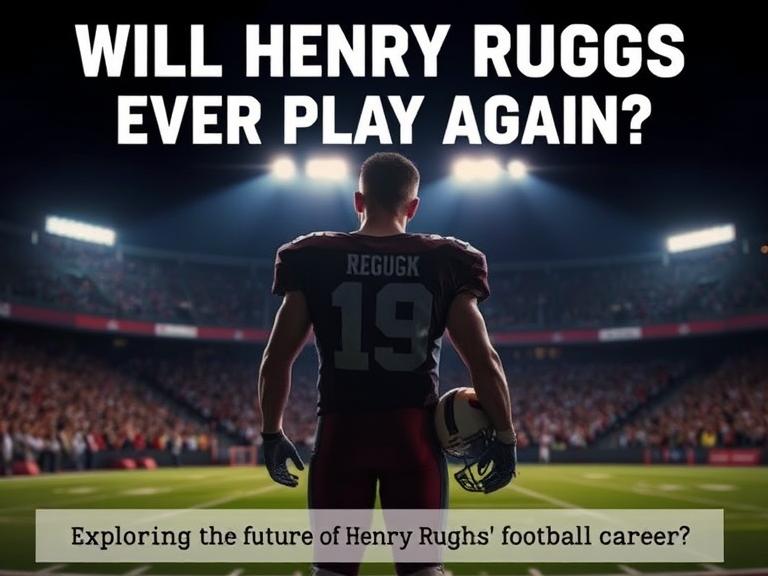Will Henry Ruggs Ever Play Again? Henry Ruggs III was once one of the most electrifying young talents in the NFL. Drafted 12th overall by the Las Vegas Raiders in 2020, the speedy wide receiver showed flashes of brilliance during his brief career. However, his football future was thrown into jeopardy following a tragic car crash in November 2021 that resulted in the death of 23-year-old Tina Tintor and her dog.
This article examines Ruggs’ legal situation, the NFL’s potential response, and whether he could ever return to professional football.
Table of Contents
The Fatal Crash and Legal Consequences
On November 2, 2021, Ruggs was driving his Corvette at 156 mph in a 45 mph zone when he rear-ended Tintor’s SUV in Las Vegas. Police reported his blood alcohol content (BAC) was 0.16% – twice Nevada’s legal limit.
Legal Outcome:
- Pleaded guilty to felony DUI resulting in death
- Sentenced to 3-10 years in prison (eligible for parole after 3 years)
- Also pleaded guilty to misdemeanor vehicular manslaughter
The case represents one of the most severe punishments ever given to an active NFL player for off-field conduct.
NFL Policy on Player Conduct
The NFL’s Personal Conduct Policy states that players can be suspended or banned regardless of criminal proceedings. Notable precedents include:
- Donte Stallworth: Suspended 1 season after 2009 DUI manslaughter
- Leonard Little: Suspended 8 games after 1998 vehicular homicide
- Adam “Pacman” Jones: Suspended entire 2007 season
Commissioner Roger Goodell has shown little leniency for offenses involving violence or endangerment of others.
Factors That Could Influence a Potential Return
1. Prison Sentence and Parole
Ruggs will be eligible for parole in late 2024 at the earliest. His behavior in prison and remorse shown will factor into early release decisions.
2. NFL Reinstatement Process
Even if released, Ruggs would need to:
- Apply for reinstatement
- Demonstrate rehabilitation
- Potentially serve additional NFL suspension
3. Public and Team Reception
Teams would weigh:
- Public relations backlash
- Ruggs’ accountability for his actions
- Whether he can contribute on-field after years away
4. Physical Readiness
At his 2026 earliest possible return, Ruggs would be 27 years old – potentially still in athletic prime if he maintains conditioning.
Historical Precedents
Few players have returned to the NFL after similar incidents:
- Leonard Little played 10 more seasons after suspension
- Donte Stallworth returned but was never the same player
- Rae Carruth (1999 murder case) was permanently banned
The severity of Ruggs’ offense makes his path exceptionally difficult.
Possible Scenarios
Best Case:
- Early parole in 2024
- NFL suspension through 2025 season
- Returns in 2026 with a team willing to give second chance
Most Likely:
- Serves full 3 years minimum
- Faces multi-year NFL suspension
- Attempts comeback in late 2020s to limited interest
Worst Case:
- Denied parole multiple times
- Permanent NFL ban
- Never plays professionally again
Ethical Considerations
The situation raises difficult questions:
- Should someone who caused a death be allowed to resume a lucrative career?
- Does Ruggs deserve opportunity for redemption?
- How should leagues balance second chances with accountability?
FAQs
Q: When is Henry Ruggs eligible for parole?
A: Earliest possible parole hearing is November 2024 after serving 3 years.
Q: Has the NFL officially banned Ruggs?
A: No formal ban yet, but he’s on the Commissioner Exempt List and likely faces lengthy suspension.
Q: What teams might sign Ruggs if reinstated?
A: Any interest would likely come from teams desperate for WR help willing to weather PR storm.
Q: How good was Ruggs before the incident?
A: In 20 games he had 50 catches for 921 yards and 4 TDs – showing elite speed but still developing.
Q: Could Ruggs play in other leagues first?
A: Possibly in CFL or XFL to prove himself, but would still need NFL clearance.
Conclusion
While not impossible, Henry Ruggs faces tremendous obstacles to an NFL return. His future depends on parole decisions, NFL discipline, and whether any team believes his talent outweighs the baggage. More than athletic ability, his genuine remorse and rehabilitation efforts will determine if he gets a second chance – both in football and life.
The tragic case serves as a sobering reminder of the irreversible consequences that can stem from a single reckless decision. Whether on the field or off, actions have lasting impacts that no amount of speed or talent can outrun.




